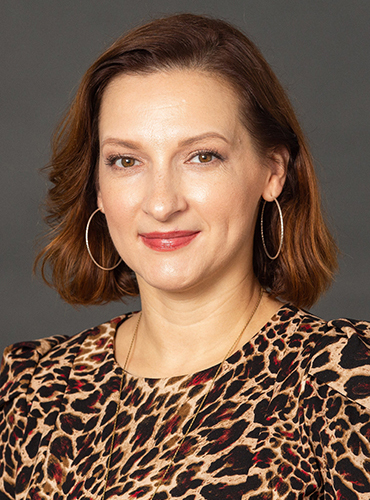
“I always wanted a transformative career where I could explore world cultures, gain rewarding experiences, while making an impact.”
Anna Abelson transformed her career from ad agency pro to Hospitality and Tourism marketing expert, harnessing her passion and inspiring people to travel and broaden their horizons. “Travel,” she says, “is an act of preventative care, a time to recharge, hinder burnout, and nurture one’s well-being to create long-term meaningful change. Travel has the power to heal mind, body and soul.”
Professor Abelson works to turn professional travelers into travel professionals, attributing cross-cultural communication and professional relationships to her success in Hospitality and Tourism. She prides herself on being a scholar-practitioner with the opportunity, because of her industry reputation, to work on innovative projects.
Below, Professor Abelson discusses her marketing expertise, the transformation of the hospitality and tourism industry, and inspiring future travel professionals.
How did you get started in Hospitality and Tourism?
I started in a non-traditional way, through advertising and marketing and then onto Hospitality and Tourism. Originally, I worked for Fortune 100 company PepsiCo International in Russia. It was certainly a meaningful experience, but I have an entrepreneurial spirit and was always interested in the various ways people communicate. When I moved to the US, I joined an ambitious boutique advertising agency, specializing in cross-cultural communications, and developed market entry strategies for international companies aiming for a US presence. From there, I worked with international airlines and then world governments and hospitality brands, igniting my passion for travel and transformative tourism, which I wanted to cultivate and share.
How do you describe your area of expertise in HT?
Working closely with stakeholders, I identify marketing strategies, across all communication channels, mindful of outcome and ROI. If we’re promoting an international destination, we utilize government entities that focus on increasing visitation, while considering local communities and overtourism. It’s a challenge, with numerous moving parts, but a successful outcome justifies the hard work, particularly the long-term meaningful impact on local populations.
At the end of the day, hospitality and tourism is a people’s industry and we are in the industry to bring change. In the hospitality and tourism industry, the stakeholders are concerned with the social, economic, and environmental impact; it’s people, profit, planet.
What does sustainability in Hospitality and Tourism mean to you?
When I started in advertising, I helped destination marketing organizations increase revenue and brand awareness by growing visitation and tourism receipts numbers. We created strategies for award-winning campaigns, considering only the numbers, not prioritizing sociocultural and environmental impacts. Now, instead of destination marketing, I focus on destination management, which includes sustainable outcomes.
But how do we develop all-important ROI and KPI while encompassing environmental sustainability for future generations? One of the successful strategies is to promote less-traveled destinations, offsetting traffic from key locations (tourist traps) and balancing visitation.
What has made you successful in Hospitality and Tourism?
Peer support, incredible mentors, cross-cultural communication, global competency, diplomacy, and skills I’ve developed meeting peoples from different cultures and countries. I work to build long-term relationships, while expanding my knowledge.
You are teaching Marketing Strategies for Hospitality and Tourism. How is marketing for Hospitality and Tourism the same and different from other industries?
Like marketing for any industry, we rely on measurement, creating impactful campaigns, and careful budgeting. We’re held accountable for our actions, our strategy, the process, and rely upon our expertise and experience. Unlike traditional marketing, we work very closely with our stakeholders in public and private sectors, intermediaries, travel suppliers, creating and promoting unique, immersive experiences, connecting cultures, and changing people’s behavior and mindset.
My vision for hospitality and tourism is to foster open minds and empathy towards various cultures and traditions, contrasting differences and similarities to our own.
What’s the biggest challenge facing Hospitality and Tourism in a post-COVID world?
COVID-19 has certainly been impactful, and we’re still going through a lot of changes. By the same token, the industry has dealt with serious challenges before; it’s very resilient. After 9/11, the airline world changed, instituting new procedures and policies, but [people] continued traveling. After COVID-19, [the hospitality and tourism industry] must reinstate consumer trust in travel safety, a challenging and time-consuming task that we’ll approach through marketing and communications, building awareness, and educating. Communication will be the key component in rebuilding this industry.
How do you prepare your students to be the Hospitality and Tourism leaders of tomorrow?
It’s important for my students to understand the commitment they’ll need to undertake. I insist they keep themselves well informed on industry news, updates, and trend analyses, which, of course, helps cultivate their own opinions. I encourage my students to network, identifying those who can further their careers, including professors with industry expertise and connections who can foster opportunities.
What is your favorite aspect of teaching?
I love inspiring and empowering the next generation of travel professionals. Helping them understand the science of behavioral economics, enabling factors, why people travel, what motivates them, and how to connect to them on a personal level. One in ten people worldwide is employed in this industry, it’s huge, multifaceted and the opportunities are endless.
What knowledge do you hope your students take away from your classes?
A clear understanding of the fragmented sectors of our industry and how to leverage relationships, build partnerships and understand the impact of the industry. Our business should be sustainable and beneficial for everyone involved. At this time, it’s really important for me to communicate the importance of being resilient, adaptable, resourceful, and flexible.
This interview has been edited for length and clarity.
Learn more about the MS in Hospitality & Tourism program.


